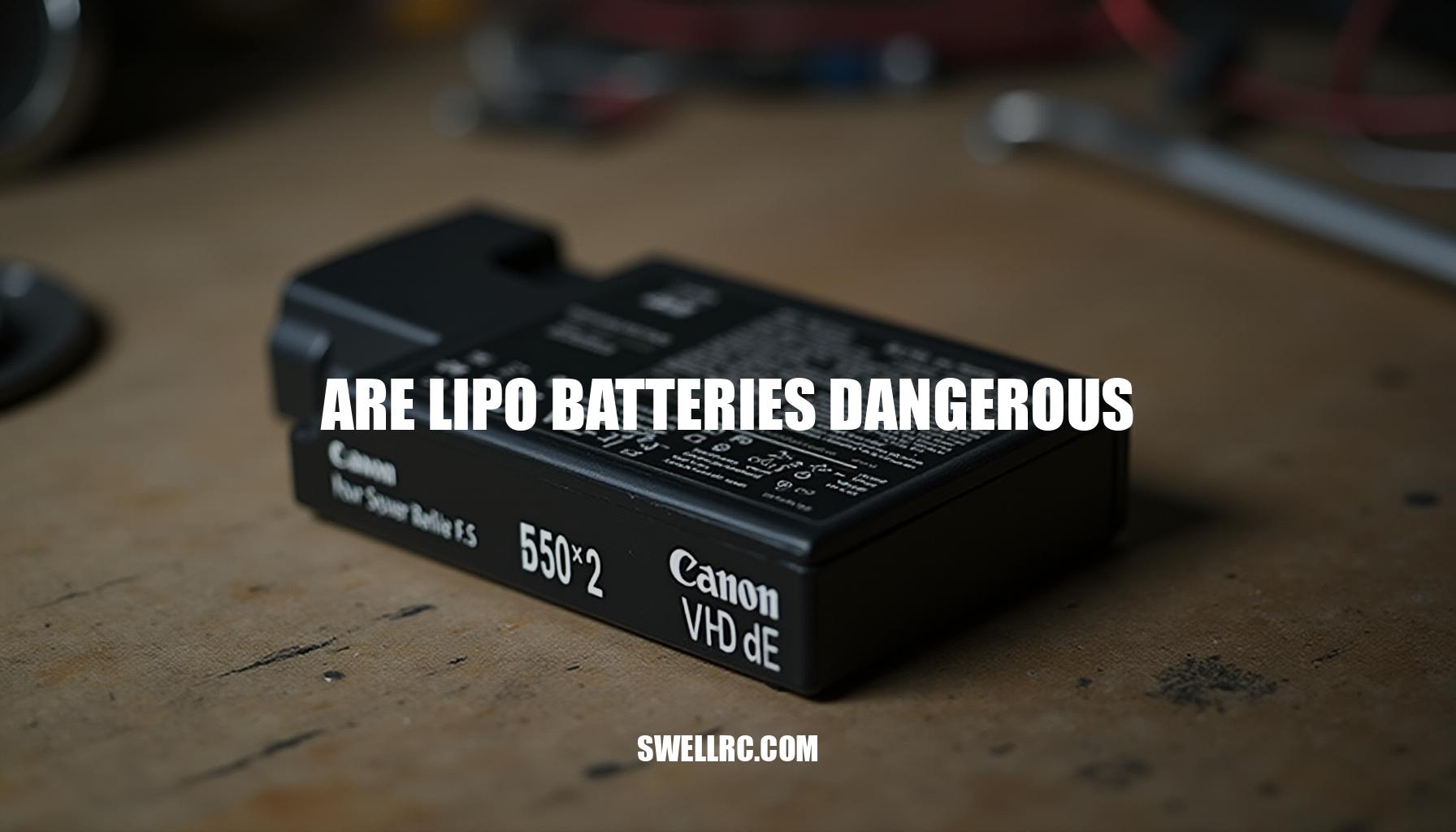Are LiPo Batteries Dangerous? A Guide to Safe Handling and Use
The first time I saw a LiPo misbehave, it wasn’t an explosion—it was a gentle puff and a sweet, solvent-like smell on my workbench. That tiny warning taught me more than a dozen forum threads ever could. Yes, LiPo (lithium polymer) packs have a reputation for being dangerous, and they absolutely deserve respect.
But after years of flying drones, ripping RC cars, and stress-testing packs in the workshop, I learned the real story: LiPos are powerful, efficient, and surprisingly well-behaved when you handle them correctly. In this article, I’ll cut past the hype and share what actually matters—how LiPos work, where the risks come from, and the simple routines that make them safe for everyday use. We’ll bust myths, walk through charging and storage habits that protect your gear, and cover what to do if something goes wrong.
If you’re wondering, “Are LiPo batteries dangerous?” the short answer is: they can be, if you ignore the rules. But with a little know-how and proper LiPo battery safety and battery maintenance, they’re the secret sauce behind fast, reliable, and crazy-fun RC batteries. Understanding charging safety and recognizing warning signs like a puffed LiPo can keep your lithium polymer packs performing at their best without incident.
Why LiPo Batteries Have a Reputation for Danger
Lithium polymer chemistry enables LiPos to pack remarkable energy density into a compact, lightweight form. Each cell typically charges to about 4.2V, with a polymer electrolyte and thin aluminum pouch that reduce weight but increase vulnerability to physical damage compared to rigid hard-can cells. When subjected to abuse like overcharging, short-circuiting, puncturing, or overheating, LiPo packs can build internal pressure, causing noticeable swelling known as a puffed LiPo.
This swelling results from chemical breakdown inside the pouch due to stress or misuse.
The risks associated with LiPos often stem from heat buildup during high current draws, especially in RC airplanes and drones. Packs that are underrated for the application, poorly cooled, or discharged below safe voltages become prone to thermal issues. Additionally, improper charging practices — such as using cheap chargers or incorrect settings — increase the overcharge risk.
Skipping the vital battery balancing step causes cells to drift apart in voltage, potentially leading to the over-voltage of individual cells.
Common causes of LiPo failures include:
- Charging with the wrong profile
- Pinching or damaging wires
- Ignoring signs of swelling or puffed packs
- Storing batteries fully charged in a hot environment
Treat a LiPo pack like a delicate fuel tank: inspect regularly for damage, charge properly using balanced charging modes, keep it cool during operation and storage, and select a pack with the appropriate C rating for your power demands. Following these best practices significantly reduces short-circuit risk and other hazards, turning the once “dangerous” LiPo into a reliable energy source.
Understanding Real vs. Perceived Risks
Understanding the LiPo fire risk is crucial for anyone using lithium polymer batteries, especially in high-performance RC models or electronics. One of the main dangers is overcharging a cell beyond 4.2V without proper balance charging, which can trigger thermal runaway, leading to fires. Additionally, physical damage such as puncturing, crushing, or bending a pouch cell often causes internal shorts, enhancing the fire hazard significantly.
Improper storage also contributes to battery degradation and safety issues. Storing a fully charged LiPo pack for weeks accelerates puffing and capacity loss. Ideal storage voltage ranges from about 3.7 to 3.85V per cell to preserve battery health.
Monitoring the voltage during use is equally important; running packs below safe voltage thresholds—such as sagging under 3.3V per cell under load or resting below approximately 3.0V—can permanently damage cells.
Despite some common LiPo myths, spontaneous explosions are very rare. Most incidents stem from misuse or hidden damage. Concerns that LiPos are unsafe for beginners are overstated; with a reliable balance charger and attention to safety rules, even novices use these batteries daily without issues.
There’s also a misconception that any swollen pack can be revived; in reality, a puffy battery is a warning sign and continued use poses risks. Moreover, high-performance models like pylon racer RC planes or gas-powered RC Lamborghinis can run safely if battery selection, wiring, cooling, and charging protocols are followed correctly.
| Risk Factor | Description | Safety Tip |
|---|---|---|
| Overcharging | Charging cells above 4.2V without balance leads to thermal runaway. | Use balance chargers; monitor voltage closely. |
| Physical Damage | Punctures or crushing cause internal shorts and fire hazards. | Handle batteries gently; avoid dropping or bending. |
| Improper Storage | Storing fully charged packs for long causes puffing and capacity loss. | Store at 3.7–3.85V per cell for longevity. |
| Voltage Sagging | Running cells under safe voltage damages them irreversibly. | Monitor pack voltage; avoid deep discharge. |
In conclusion, understanding the risks associated with LiPos and practicing regular voltage monitoring, proper charging, and safe storage easily dispels fear. These batteries can be safe and reliable for beginners and seasoned users alike when handled with knowledge and care.
Safe Use Guidelines: How I Tested LiPo Limits
Maintaining safety and longevity in RC battery care boils down to a few essential principles I follow religiously. First, balance charging is a must: always set the chemistry to LiPo and the correct cell count, then verify the on-screen voltage before starting the charge. For the safe charging current, I stick to 1C (for example, 5A for a 5000 mAh pack) and reduce it for hot or older cells to prevent stress.
I strictly stop charging at 4.20V per cell, avoiding any “top off” beyond this voltage to protect battery health. Temperature also plays a vital role; I perform temperature checks and never charge a pack if it feels anything warmer than room temperature—cool it down first. Essential tools on my bench include a quality balance charger, an IR meter to monitor cell health, a cell checker, and charging the batteries inside a LiPo-safe bag or metal box to contain any possible hazards.
I never leave charging packs unattended or overnight to ensure immediate response if something goes awry.
- Always balance charge with correct chemistry and cell count
- Keep charging current at or below 1C for safety
- Stop charging at 4.20V per cell to avoid degradation
- Perform temperature checks; charge only at room temp or cooler
- Use an IR meter and cell checker to monitor battery health regularly
- Charge batteries inside a LiPo bag or metal box for added safety
- Never charge unattended or overnight
- Store batteries at 3.7–3.85V per cell, employing a storage cycle if unused for over 48 hours
- Inspect for swelling, damage, or smell before every use
Storage voltage management is crucial; keeping packs at nominal voltage dramatically improves aging, as confirmed by stress testing. Moreover, monitoring internal resistance with an IR meter reveals declining battery health long before performance issues appear. These battery balancing practices, coupled with diligent temperature and storage management, form the backbone of reliable and safe RC battery use.
What To Do If Something Goes Wrong
Recognizing the warning signs of a puffed LiPo or damaged LiPo battery is crucial for safety and effective emergency response. Key red flags to watch for include:
- Swelling or a soft, pillow-like feel.
- A sweet, solvent-like smell accompanied by visible smoke or hissing sounds.
- Excessive heat during charging or after light use.
- Cells that fail to balance or exhibit a sudden increase in internal resistance.
If you encounter a puffed or damaged pack, follow these steps carefully: First, stop using the battery immediately, unplug it, and move it to a nonflammable surface such as concrete, away from people. Next, place the pack in a LiPo-safe container or a metal bucket filled with sand to allow it to cool and stabilize.
It is essential not to puncture, crush, or attempt to vent the battery. In case of ignition, do not use water; instead, smother the flames with sand and let it burn out safely. For safe discharge, use a dedicated discharger or a high-wattage resistor in a controlled area before proceeding with proper LiPo disposal.
Finally, take the battery to a certified e-waste or battery recycling facility in accordance with local regulations to ensure environmentally responsible handling.
For hobbyists seeking further information, resources such as how to fix swollen LiPo battery provide in-depth background and techniques. Additionally, reviewing usage habits that often precede failures—like excessive heat, overdraw, or poor storage—is advised. Insights into lifespan and maintenance can be found in articles like how long does a Traxxas battery last.
Remember, investing in a cheap pack is never worth risking a garage fire; when in doubt, retire the battery to ensure safety.
LiPos on the Move — Travel and Transport Safety
Airline rules are notably stricter when it comes to LiPo transport, yet traveling with your RC gear can be straightforward if you come prepared. To comply with airline policies and ensure a smooth security check, I always adhere to a few essential guidelines for carrying my batteries and equipment:
- Carry-on only: Never place LiPos in checked luggage; always keep them with you in your carry-on bags.
- Terminals protected: Use caps or tape to insulate terminals and store each pack inside a fireproof LiPo bag.
- Watt-hour limits: Understand that packs under 100 Wh require no airline approval, packs between 100–160 Wh usually need approval, and packs above 160 Wh are prohibited on passenger flights. Remember, watt-hours (Wh) equal volts multiplied by amp-hours (e.g., a 4S 14.8V × 5.0Ah pack equals 74 Wh).
- Storage voltage: Keep your batteries at storage voltage and clearly label the Wh rating on each pack to speed up inspection processes.
- Documentation: Bring paperwork for your charger and battery packs in case TSA requests verification.
These steps harmonize perfectly with what most airlines require regarding carry-on batteries and help you avoid delays or complications.
I also found this handy primer on flying with RC cars helpful, especially if you’re packing more than just batteries.
From my experience, the only time TSA pulled me aside was due to loose connectors. After showing them the labels and confirming storage voltage on my packs, I was waved through without trouble. This just proves how proper preparation with respect to airline rules, watt-hour limits, storage voltage, and protective fireproof bags saves you from headaches during travel.
Beyond Safety — Why LiPos Are Still Worth It
Even with their rules, LiPo batteries remain the gold standard for both hobbyists and professionals because they deliver an unmatched power-to-weight ratio, high discharge rates, and fast charging capabilities that elevate any performance setup. Why I still choose LiPo comes down to several key advantages:
- Power density: LiPos provide an incredible punch for launches, bursts, and sustained power draws that few other chemistries can match.
- Flexibility: They come in a wide range of sizes, cell counts, and C ratings, allowing you to tailor your pack precisely to your build.
- Responsiveness: Low internal resistance translates directly to a crisp throttle feel and immediate power delivery.
- Fast turnaround: LiPo packs can safely charge at 1C, with some supporting even higher rates when adequately cooled, keeping you flying or racing with minimal downtime.
In real-world applications, many turbine setups rely on LiPos for ECU starts, pumps, or avionics—demonstrating their reliability in critical performance scenarios (see model jet engine basics). Additionally, micro quads and small drones thrive on compact LiPo packs; if you’re piloting a mini camera rig, learning efficient charging methods like those for the Tello drone can optimize battery life and performance (how to charge Tello drone).
Handled with respect and proper care, LiPos transform careful planning into thrilling, high-performance experiences.
Far from dulling the fun, understanding these batteries multiplies it by unlocking their true potential.
Conclusion — The Final Verdict on LiPo Battery Danger
Are LiPo batteries dangerous? They can be, just like any high-energy power source mishandled. However, after countless flights, races, and bench tests, my verdict is clear: with education, monitoring, and disciplined habits, LiPos are safe for everyday use and unbeatable for performance.
Here is a LiPo safety summary to keep in mind:
- Battery monitoring: Always keep an eye on temperatures and voltages during use to prevent overcharging or overheating.
- Safe handling: Treat LiPo batteries like precision tools, not consumables. Handle with care to avoid physical damage.
- Storage best practices: Store batteries at their nominal voltage and in a cool, dry place to extend lifespan and maintain safety.
- Regular inspections: Examine your batteries often for swelling, punctures, or any signs of damage.
- Balance charging: Use quality balance chargers to ensure each cell is charged evenly, improving performance and safety.
By following these guidelines, the reward is reliable power, longer-lasting packs, and fewer surprises. After all the hours I spent experimenting, the pattern is obvious: adhering to proper LiPo safety and handling allows you to unlock everything that makes this hobby fast, capable, and incredibly satisfying—without losing sleep over your batteries.
Frequently Asked Questions
- Are LiPo batteries safe for everyday use?
Yes—when you follow basic rules: balance charge, avoid overcharging and deep discharge, inspect for damage, keep them cool, and store at 3.7–3.85V per cell. Millions are used daily without incident. - What makes LiPo batteries dangerous compared to other types?
High energy density in a soft pouch and sensitivity to overvoltage, puncture, and heat. Misuse can lead to swelling or thermal runaway, but proper charging and storage greatly reduce risk. - Can a damaged LiPo battery catch fire?
Yes. Physical damage, internal short circuits, or overcharging can ignite a LiPo. If a pack puffs, gets hot, or smells like solvent, isolate it immediately and retire it safely. - How can I tell if my LiPo battery is bad or swollen?
Look for a puffy or soft feel, increased internal resistance, cells that won’t balance, unusual heat under light load, or a sweet chemical smell. Any of these are grounds to stop using the pack. - What safety steps should I follow when charging LiPo batteries?
Balance charge at about 1C, confirm the correct cell count and chemistry, charge at room temperature in a LiPo bag, monitor the pack, and never charge unattended or overnight. - Is it okay to leave a LiPo battery charging overnight?
No. LiPos should never be left charging unattended. Stay nearby, and end the charge when it reaches 4.2V per cell. - How should LiPo batteries be stored long-term?
Store at 3.7–3.85V per cell in a cool, dry place, ideally in a fire-resistant container. Check voltage every 1–2 months and top up to storage level if needed. - What’s the safest way to dispose of a LiPo battery?
Discharge it fully in a safe area using a discharger or resistor, tape the leads, and take it to a proper e-waste or battery recycling facility. Never puncture or throw it in household trash.



